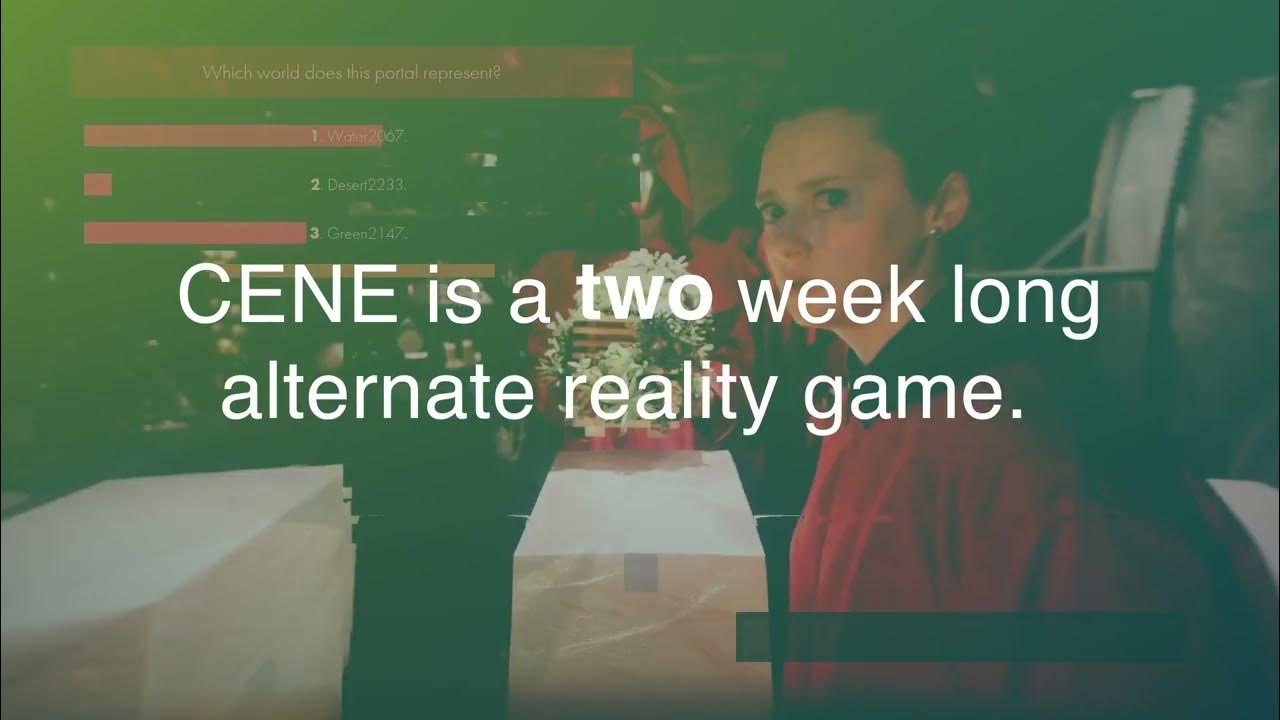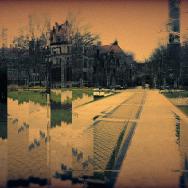In the year 2747, the internet could be powered by mushrooms. In 2107, the entire human population might live underground. Perhaps Earth will be made up of floating cities in 2099.
These possible futures were explored by over 350 middle school students as part of the alternate reality game Cene—created by an interdisciplinary group of game designers based at UChicago.
Seventh-grade students at Bret Harte Elementary, UChicago Woodlawn Charter, and the University of Chicago Laboratory Schools piloted a three-week “narrative scavenger hunt,” tackling themes and quests related to climate change.
The game’s name comes from “Anthropocene”—the name given for our current geological era defined by human impact on the environment. For Prof. Patrick Jagoda, climate change is a huge issue that students tend to learn about too late.
“If this is a generational issue that is going to impact policy, economics, everyday wellbeing for these students—why not start when they’re 12 years old?” asked Jagoda, Cene’s co-director.
When science teacher Tony Del Campo asked his seventh-graders what they wanted to learn that year, “A lot of kids said, ‘What is climate change? What's global warming? How can I do something to help?'” said Del Campo, who teaches at UChicago's Laboratory Schools. “I think they're getting the sense that ‘I live in this world. I’m a citizen. I need to figure out how to make this world last for me and and after me.’”

In partnership with local teachers, Cene was developed by The Fourcast Lab—a game design collective led by six core members: Jagoda, Heidi Coleman, Ashlyn Sparrow, Marc Downie, Kristen Schilt and Ben Kolak.
These UChicago-based scholars and artists design alternate reality games, or ARGs, which address big problems like health, social connection and climate change. ARGs are “transmedia”—meaning players move between the real world and online spaces.
“You might meet a character through an Instagram or a Tiktok account,” said Jagoda, who studies digital media and game design. “You might go to Twitch and find somebody's channel that ends up drawing you further into the series of puzzles.”

The Lab's past games include A Labyrinth and ECHO, which were mainly designed for UChicago students. But both Jagoda and fellow co-director Heidi Coleman were interested in engaging a new audience: local middle school students.
Ready player one
Cene starts with a video. “Welcome to the Fourcast Lab,” said Coleman in an introductory message for the three seventh-grade classrooms. Often blurring the line between reality and fiction, Fourcast Lab members in-game personas wear lab coats and have titles like “quantum botanist.”
“We need your help in tackling a huge challenge,” says the Cene version of Jagoda, who sits in front of a fireplace styled like a vortex.
The Lab members reveal they’ve uncovered a new phenomenon: The Possibility Space. “The Possibility Space is like a library that contains not just every book that’s been written, but every book that could be written. Except it doesn’t contain books—it contains worlds,” said Assoc. Prof. Kristen Schilt, another member of the Fourcast Lab, in Cene.
But, the Possibility Space—and all its strange worlds—is under threat. A mysterious “cosmic force of nature” called The Darkness seeks to destroy all our possible futures; only by working together can players fight back The Darkness.
To defeat this threat, students were challenged to tackle a series of quests related to a revealed future world.

During game days, the three science classes were abuzz with activity as students solved puzzles, created code and composed songs. “There was a lot of energy,” said Del Campo.
After three weeks, the students had completed nearly 2,500 quests while a running leaderboard encouraged friendly competition.
To keep things even more interesting, villains called the Veilers crashed the game’s finale—a live-streamed event with all three schools. Players made decisions in real time to successfully save our future.
New skill unlocked
Fourcast Lab co-directors Jagoda and Coleman believe games are a powerful educational tool.
“Games speak to many different kinds of learners,” said Jagoda. “Some people will listen to a lecture and just their brains will turn off. But with a game, you have text, you have images, you have sound, you have animation, you have different forms of decision-making.”
For Coleman, games can get us out of our comfort zones. “Games, especially the intersection of games and performance, seem to create a space where people can shift out of entrenched ideas,” said Coleman, who also teaches theater and performance at UChicago.
Both Del Campo and fellow science teacher Tiffany Gills felt like Cene exposed their students to STEM content, but also helped develop key skills like being a team player, communication and analyzing information.
Quests often included terms or concepts that encouraged students to do independent research. “If they have a question, they're like, ‘I gotta get my computer out, look it up,’” said Gills, an earth science teacher at the Laboratory Schools. “They will go and research more on their own.”
The game also helps students think many generations into the past or future. “Having them think years in advance, that’s a really good way to strengthen this ‘timefulness’ skill,” said Del Campo. “What decisions in the past have led to this? What decisions are we making now? This is something that we’re working on in our curriculum.”
Hope for the future
The future of Cene, like our own world, is unknown. But the game’s designers believe that it could scale to any number of schools in Chicago, or even anywhere in the country.
Even if the exact experience of Cene isn’t replicated, Jagoda hopes it serves as a model of what could be done. “When there’s a hard, urgent problem, what are things we can do that are creative, that are innovative to get us outside of this?” asks Jagoda.

For the participating teachers, Cene represents a way of talking to students about troubling issues while still maintaining a sense of hope. “It’s important for our students to understand the science of climate change. But I also think it’s important to make sure it’s not all doom and gloom,” said Del Campo. “That’s what I like about this game. It’s something where they feel like they have some control over their destiny.”
“This is a real-world issue that they’re handling firsthand,” said Gills. “Hopefully they continue doing the game because the kids really loved it.”
“It’s not that I feel I can change the future,” said a student at Bret Harte School. “It’s that I know I can change the future.”


















